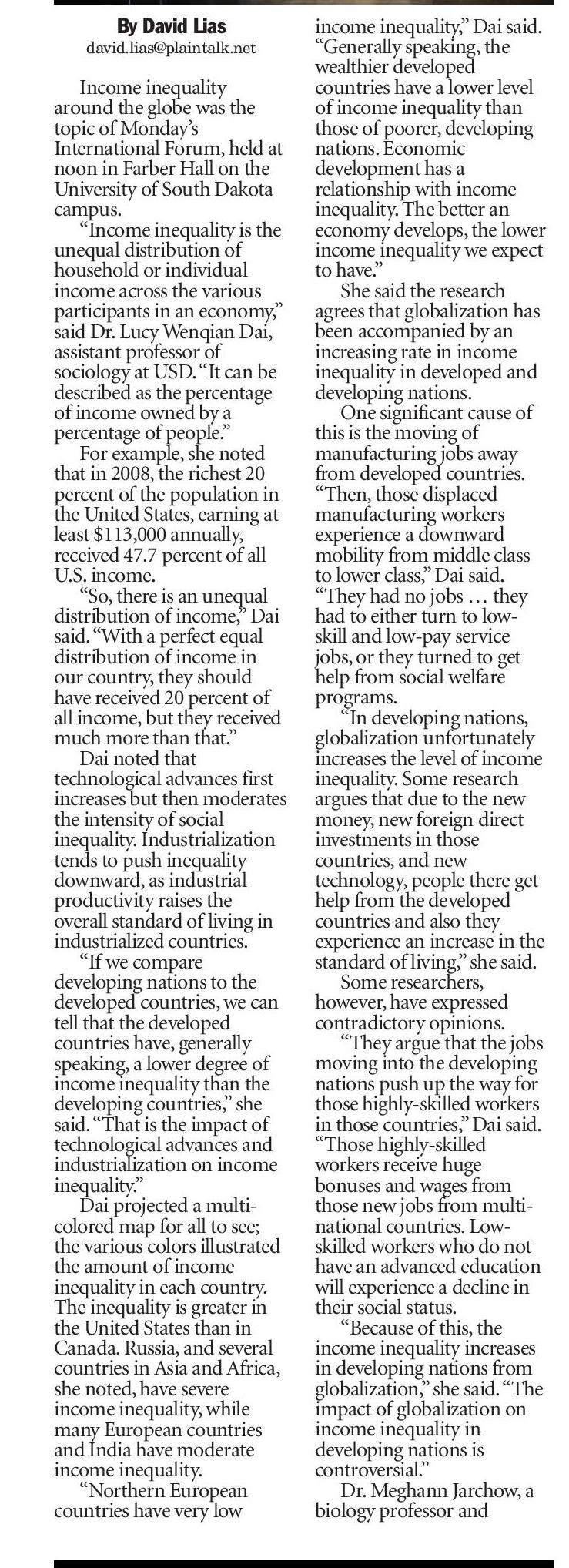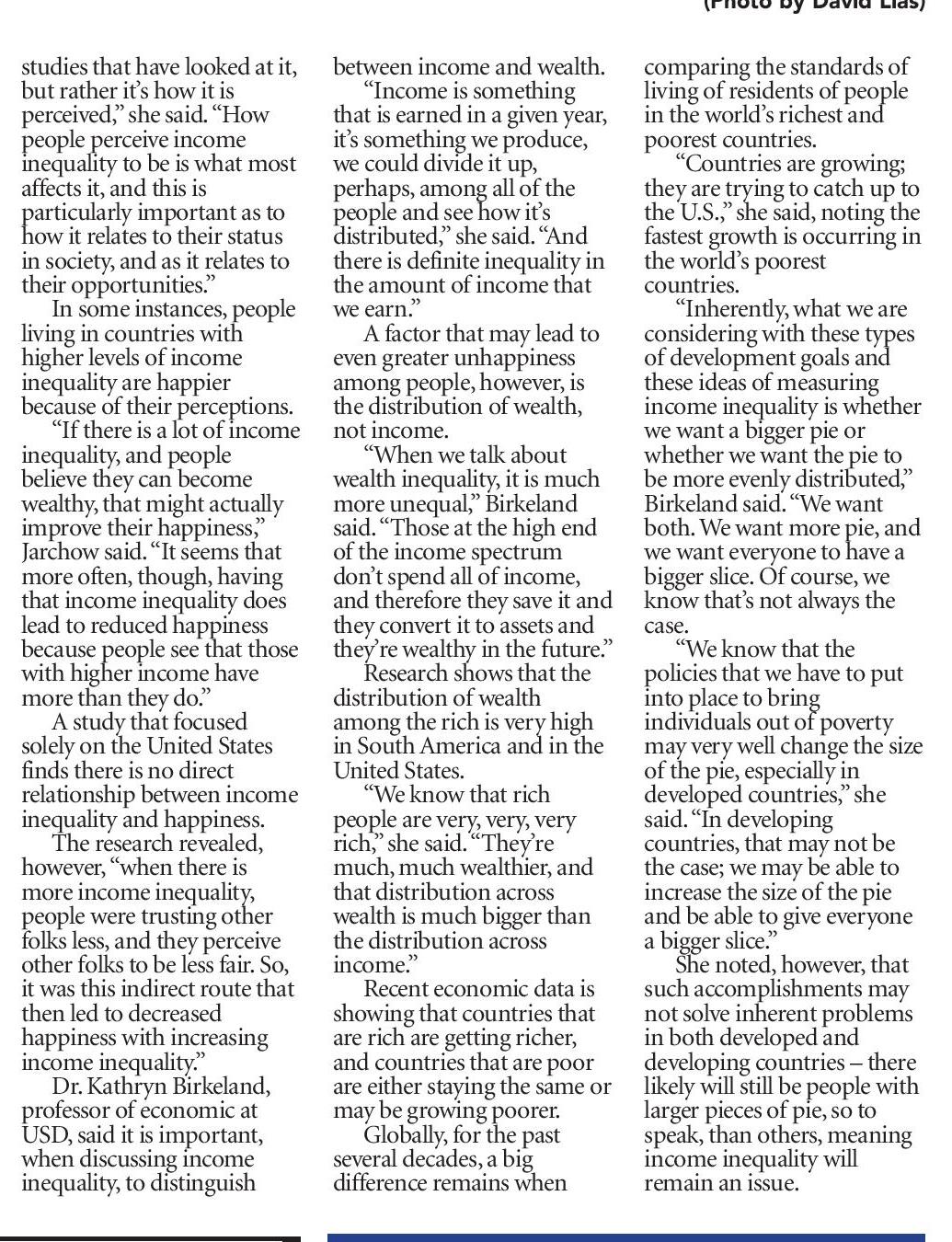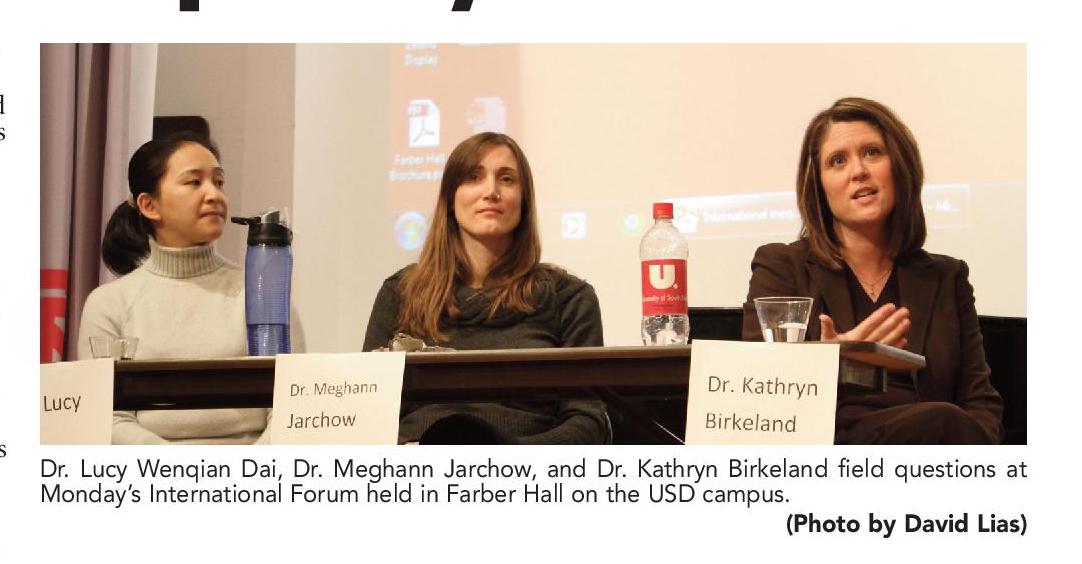031114_YKBP_A 5.pdf










Broadcaster Press 05
March 11, 2014 www.broadcasteronline.com
Forum: Globalization may increase
income inequality
By David Lias
david.lias@plaintalk.net
Income inequality
around the globe was the
topic of Monday’s
International Forum, held at
noon in Farber Hall on the
University of South Dakota
campus.
“Income inequality is the
unequal distribution of
household or individual
income across the various
participants in an economy,”
said Dr. Lucy Wenqian Dai,
assistant professor of
sociology at USD. “It can be
described as the percentage
of income owned by a
percentage of people.”
For example, she noted
that in 2008, the richest 20
percent of the population in
the United States, earning at
least $113,000 annually,
received 47.7 percent of all
U.S. income.
“So, there is an unequal
distribution of income,” Dai
said. “With a perfect equal
distribution of income in
our country, they should
have received 20 percent of
all income, but they received
much more than that.”
Dai noted that
technological advances first
increases but then moderates
the intensity of social
inequality. Industrialization
tends to push inequality
downward, as industrial
productivity raises the
overall standard of living in
industrialized countries.
“If we compare
developing nations to the
developed countries, we can
tell that the developed
countries have, generally
speaking, a lower degree of
income inequality than the
developing countries,” she
said. “That is the impact of
technological advances and
industrialization on income
inequality.”
Dai projected a multicolored map for all to see;
the various colors illustrated
the amount of income
inequality in each country.
The inequality is greater in
the United States than in
Canada. Russia, and several
countries in Asia and Africa,
she noted, have severe
income inequality, while
many European countries
and India have moderate
income inequality.
“Northern European
countries have very low
income inequality,” Dai said.
“Generally speaking, the
wealthier developed
countries have a lower level
of income inequality than
those of poorer, developing
nations. Economic
development has a
relationship with income
inequality. The better an
economy develops, the lower
income inequality we expect
to have.”
She said the research
agrees that globalization has
been accompanied by an
increasing rate in income
inequality in developed and
developing nations.
One significant cause of
this is the moving of
manufacturing jobs away
from developed countries.
“Then, those displaced
manufacturing workers
experience a downward
mobility from middle class
to lower class,” Dai said.
“They had no jobs … they
had to either turn to lowskill and low-pay service
jobs, or they turned to get
help from social welfare
programs.
“In developing nations,
globalization unfortunately
increases the level of income
inequality. Some research
argues that due to the new
money, new foreign direct
investments in those
countries, and new
technology, people there get
help from the developed
countries and also they
experience an increase in the
standard of living,” she said.
Some researchers,
however, have expressed
contradictory opinions.
“They argue that the jobs
moving into the developing
nations push up the way for
those highly-skilled workers
in those countries,” Dai said.
“Those highly-skilled
workers receive huge
bonuses and wages from
those new jobs from multinational countries. Lowskilled workers who do not
have an advanced education
will experience a decline in
their social status.
“Because of this, the
income inequality increases
in developing nations from
globalization,” she said. “The
impact of globalization on
income inequality in
developing nations is
controversial.”
Dr. Meghann Jarchow, a
biology professor and
director of the sustainability
program at USD, talked
about income inequality and
the bearing it has on people’s
happiness.
“Generally, what I’ve
heard is that if you increase
the income inequality, so
there is more difference
between folks who are really
rich and folks who are really
poor, you have more
unhappiness,” she said.
She, too, projected a map
that illustrates the results of
subjective surveys of people’s
level of happiness. The
“happiest” countries,
according to the survey –
Canada, northern European
nations, and Western
Europe, also have lower
levels of income inequality.
“The United States and
South America are less so,
but generally tend to be
pretty happy,” Jarchow said.
People in Africa, India
and China rate themselves as
being less happy.
“If we’re going to look at
a major trend in terms of
places that have a lot of
income equality, Scandinavia
is doing spectacularly well,
and also Canada, western
Europe, and Australia,” she
said.
A trend that has emerged
from her study of various
research, Jarchow said, shows
that countries where most of
the people are wealthy and
where there is greater
income equality receive an
additional benefit.
“That (trend) boosts
people’s happiness even
farther,” she said. “The
United States … has quite a
bit of income inequality.
We’re a country where
people are very wealthy; the
median income in the
United States is very high,
but somehow, our happiness
does not exactly track to
that.”
Jarchow said, however,
that there isn’t one universal
relationship between
happiness and income
inequality.
“One general statement
that I’ve read is that really the
level of inequality is not the
most important factor
according to some of the
Dr. Lucy Wenqian Dai, Dr. Meghann Jarchow, and Dr. Kathryn Birkeland field questions at
Monday’s International Forum held in Farber Hall on the USD campus.
(Photo by David Lias)
studies that have looked at it,
but rather it’s how it is
perceived,” she said. “How
people perceive income
inequality to be is what most
affects it, and this is
particularly important as to
how it relates to their status
in society, and as it relates to
their opportunities.”
In some instances, people
living in countries with
higher levels of income
inequality are happier
because of their perceptions.
“If there is a lot of income
inequality, and people
believe they can become
wealthy, that might actually
improve their happiness,”
Jarchow said. “It seems that
more often, though, having
that income inequality does
lead to reduced happiness
because people see that those
with higher income have
more than they do.”
A study that focused
solely on the United States
finds there is no direct
relationship between income
inequality and happiness.
The research revealed,
however, “when there is
more income inequality,
people were trusting other
folks less, and they perceive
other folks to be less fair. So,
it was this indirect route that
then led to decreased
happiness with increasing
income inequality.”
Dr. Kathryn Birkeland,
professor of economic at
USD, said it is important,
when discussing income
inequality, to distinguish
between income and wealth.
“Income is something
that is earned in a given year,
it’s something we produce,
we could divide it up,
perhaps, among all of the
people and see how it’s
distributed,” she said. “And
there is definite inequality in
the amount of income that
we earn.”
A factor that may lead to
even greater unhappiness
among people, however, is
the distribution of wealth,
not income.
“When we talk about
wealth inequality, it is much
more unequal,” Birkeland
said. “Those at the high end
of the income spectrum
don’t spend all of income,
and therefore they save it and
they convert it to assets and
they’re wealthy in the future.”
Research shows that the
distribution of wealth
among the rich is very high
in South America and in the
United States.
“We know that rich
people are very, very, very
rich,” she said. “They’re
much, much wealthier, and
that distribution across
wealth is much bigger than
the distribution across
income.”
Recent economic data is
showing that countries that
are rich are getting richer,
and countries that are poor
are either staying the same or
may be growing poorer.
Globally, for the past
several decades, a big
difference remains when
comparing the standards of
living of residents of people
in the world’s richest and
poorest countries.
“Countries are growing;
they are trying to catch up to
the U.S.,” she said, noting the
fastest growth is occurring in
the world’s poorest
countries.
“Inherently, what we are
considering with these types
of development goals and
these ideas of measuring
income inequality is whether
we want a bigger pie or
whether we want the pie to
be more evenly distributed,”
Birkeland said. “We want
both. We want more pie, and
we want everyone to have a
bigger slice. Of course, we
know that’s not always the
case.
“We know that the
policies that we have to put
into place to bring
individuals out of poverty
may very well change the size
of the pie, especially in
developed countries,” she
said. “In developing
countries, that may not be
the case; we may be able to
increase the size of the pie
and be able to give everyone
a bigger slice.”
She noted, however, that
such accomplishments may
not solve inherent problems
in both developed and
developing countries – there
likely will still be people with
larger pieces of pie, so to
speak, than others, meaning
income inequality will
remain an issue.
IMMEDIATE OPENINGS
-Licensed
-Bonded
-Insured
OAKWOOD APARTMENTS
•AFFORDABLE RENT
ADJUSTMENT FOR YOUR INCOME
•LARGE 2 AND 3 BEDROOM RENTAL UNITS
•STOVE, REFRIGERATOR & AIR CONDITIONING
•OFF-STREET PARKING AND PLUG-INS
•UTILITIES INCLUDED
•ON-SITE COIN LAUNDRY
•PLAYGROUND EQUIPMENT & SAND BOX
•3 BLOCKS FROM CAMPUS
Wakonda, SD • 605-267-2768 • Cell: 605-661-1063
LONG REACH EXCAVATOR
WITH 65’ OF REACH
Give us a call for a quote …
CALL NIKKI OR DAVE
(605) 624-9557
EQUAL HOUSING
OPPORTUNITY
Spirit Mound Township
Equalization Meeting
Tuesday, March 18th, 7 PM
Clay County Extension Of?ce
Appeals must be mailed to clerk and post
marked no later than March 13, 2014
Curt Brodsky
31179 462nd Avenue
Vermillion, SD 57069
HEINE
Electric and Irrigation
Senior Living at Its Best
Dakota Gardens of Sanford Vermillion
Hartington, NE (402) 254-2568
Vermillion, SD (605) 670-9567
ALL TYPES OF DIRT WORK. FREE ESTIMATES.
Enjoy the freedom to maintain your independent lifestyle while living in
a safe, secure environment at Dakota Gardens.
Irrigation sales
and service
We provide:
Irrigation PVC, Wire Installed
Well Drilling – Domestic and Irrigation
Pump Installation
Waterline & Electric
Trenching
Because our facility is connected to Sanford Vermillion Medical Center,
you also have immediate access to our health care services.
Tree & Concrete Removal
Site Clearing
Ditch Cleaning
To learn more
To learn more about Dakota Gardens, call
Dakota Gardens, call
Melissa Langle-Lee
Melissa Langle-Lee at (605) 638-8423.
Grain Hauling
Manure Hauling
Crushed Concrete
sanfordvermillion.org
sanfordvermillion.org
610-12400-0548 9/13






















 Previous Page
Previous Page






